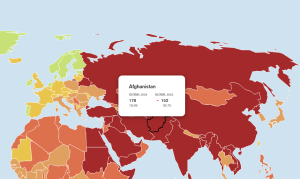Afghanistan International TV (AITV), based in London, finds itself in the crosshairs of Taliban scrutiny. The militant group has issued a stern warning to journalists and experts, cautioning against any association with the network, labeling it a potential crime. This move marks a significant escalation as it’s the first time the Taliban have targeted a specific media outlet.
The Taliban-controlled Ministry of Information and Culture alleges professional misconduct and ethical breaches on the part of Afghanistan International TV . Spokesperson Habib Ghofran cited numerous reasons, including accusations of misinformation and undermining the ruling system. According to deputy minister Zia ul Haq Haqmal, collaboration with AITV could result in legal consequences, signaling a tightening grip on media freedoms.

Despite the threats,Afghanistan International TV ‘s director, Harun Najafizada, remains defiant, asserting that the channel operates independently without personnel in Afghanistan. Instead, they rely on citizen journalism, emphasizing rigorous fact-checking processes. Najafizada denounces the Taliban’s attempts to stifle free media, highlighting the importance of upholding professional standards.
The media landscape in Afghanistan faces mounting challenges, with press freedom deteriorating rapidly. Reporters Without Borders ranks Afghanistan near the bottom in terms of press freedom, citing recent incidents of journalist arrests and media censorship. In April, three radio reporters were detained for broadcasting music deemed inappropriate by local authorities.
Additionally, the Taliban’s suspension of two TV stations further exacerbates concerns over media censorship. Barya TV’s director, Latif Sadiq, refutes the allegations, emphasizing the lack of due process in the suspension. The uncertain future of media outlets underscores the precarious situation for journalists, especially women who face additional restrictions.
Since the Taliban’s resurgence in 2021, many media organizations have shuttered due to funding shortages or staff exodus. The echoes of the Taliban’s previous regime, which banned most forms of media during the late 1990s, continue to reverberate in Afghanistan’s media landscape.
Despite the challenges, AITV and other media outlets remain resilient, determined to uphold the principles of press freedom amid increasing threats and censorship. The ongoing struggle for media independence in Afghanistan underscores the critical role of journalism in safeguarding democratic values and promoting transparency.


